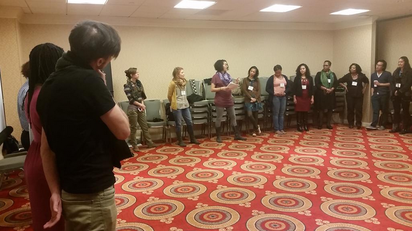 Cassie and Paloma facilitating at the 2014 Facing Race Conference. Photo by Jacqueline Lawton. Cassie and Paloma facilitating at the 2014 Facing Race Conference. Photo by Jacqueline Lawton. One of the most challenging aspects of the conference was deciding upon which breakout session to attend. There were so many wonderful choices! The opening plenary addressed work of youth activists and organizers and the evening key note offered a powerful intergenerational conversation around racial justice and equity. My break sessions offered a meditation on the intersection of race and ethnicity and the role of both the arts and government. What follows are my notes from each session: This is How We Do It: Youth Led Racial Justice Description: A new generation of racial justice leaders are interrupting and innovating in the ways racial justice work is made relevant in our times. In various ways, young people are working creatively, intersectionally and courageously to set our nation on course for the racially just future we deserve. Click here to learn more about the session and speakers. It was excellent way to begin the day by focusing on youth activist and organizers. Their ambition, focus, and ideals were insightful and inspiring. While they are seeking counsel and guidance from elders, they aren’t waiting for adults to step in and intervene on their behalf. Here are the greatest takeaways for me from this panel discussion:
Reclaiming Government: A Dialogue about the Intersection of Race, Ethnicity and the Public Sector’s Role in Advancing Equity Description: The challenges and opportunities of an increasingly diverse America demand that we rebuild broad public support for an active governmental role in creating opportunities and reducing inequities. The implicit and explicit racialization of policies, programs and public systems can not only exacerbate inequities but also influence the public’s perception of and relationship to government. Click here to learn more about the session and speakers. We began the conversation generating a list of questions that we wanted to address. Here are the ones that guided the conversation:
The discussion that followed was as rich and thoughtful. Here are some of the suggestions and observations that stayed with me:
From there, we began to address specific way to be in dialogue with members of the public sector. If someone opposes racial justice or reform police, then convincing them to support it requires several things:
Then, we discussed the careful negotiation of data. Of course, we need to gather data and research to prove our claims and support our initiatives. However, data can drive people away:
It is important to lead with values, contextualize the data with stories or narrative, and know your audience. Here is where stories are so beneficial:
For those working in the arts, I strongly encourage you to visit the Performing Arts Alliance and make use of theirAdvocacy Basics for Performing Arts Organizations. Creative Convening: Moving Racial Equity Forward Through the Arts Description: Dance Exchange breaks boundaries between stage and audience, and theater and community. For 38 years, we have been stretching the range of contemporary dance through bringing ideas into action. We are partnering with Dallas Faces Race to ask how communities can use creative strategies to advance racial equity, in Dallas and beyond. Click here to learn more about the session and speakers. During this session, participants engaged in personal storytelling and dance. They were asked to focus on their personal histories and to examine how these histories informed their decisions on an individual and structural level. While the work didn’t focus specifically on race, participants demonstrated the listening skills, collaboration, and intergenerational work required to undo racism and move towards a more equitable future. Working in pairs, participants were asked to reflect on and share verbal responses to the following prompts:
From there, participants worked in pairs to share stories and make creative responses (sounds, movements, and gestures) to the following prompts:
In closing, participants were asked to meditate on something they would carry forward from this experience and pass on in some way. While there wasn’t time to hear the verbal response, we were able to see pairs dance and it was beautiful work. This breakout session is part of a 2-year engagement that Dance Exchange has with Dallas-based partners. It’ll be exciting to see what develops and what materials are created to pass this work on to others. Keynote Address The keynote speakers for this year’s Facing Race National Conference were Dr. Bernice Johnson Reagon, Toshi Reagon, and Tashawn Reagon. It was a passionate and inspiring conversation that illustrated the significance of art, activism, and the intergenerational work around racial justice and equity. These thoughts and reflections resonated most with me:
We were encouraged us to dig deep and lean into discomfort. We were reminded to engage in work that brings about healing and meets each other with kindness. And however tired we might feel at any given moment on this journey, we who believe in freedom cannot rest until it comes. The room shook with the truth they were speaking. I went to sleep that day feeling a renewed sense of purpose and hope for the work ahead.
0 Comments
Your comment will be posted after it is approved.
Leave a Reply. |
My BlogI'm a playwright, dramaturg, and teaching artist. It is here where you'll find my queries and musings on life, theater and the world. My posts advocate for diversity, inclusion, and equity in the American Theatre and updates on my own work. Please enjoy!
Categories
All
Archives
June 2020
Reading List
|
